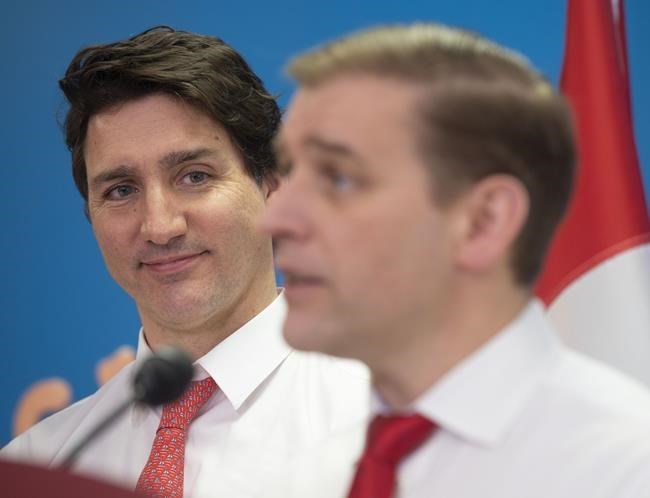ST. JOHN'S, N.L. — The chummy Liberal leaders of Canada and of Newfoundland and Labrador sparred this week over the federal government's consumer carbon levy.
Prime Minister Justin Trudeau accused Newfoundland and Labrador Premier Andrew Furey on Friday of "continuing to bow to political pressure" in his opposition to an anticipated increase to carbon costs next month.
"I think Canadians in Newfoundland and Labrador, and right across the country, expect their governments to do the right thing," Trudeau told reporters in Montreal.
He said that includes supporting Ottawa's carbon pricing scheme, which the prime minister said returns more money to most Canadian households in rebates than what they pay out, adding, "it's basic math."
Furey's office fired back with a statement shortly after the prime minister's remarks.
"Premier Furey has always been clear that the federal carbon tax is not the appropriate instrument to mitigate climate change at this time, and that he will continue to fight for Newfoundlanders and Labradorians," it said.
Furey is the country's only Liberal provincial premier, and he has long touted his close relationship with Trudeau. But he's been pushing back against the federal carbon pricing regime since at least last year.
The pricing system, which is a levy on greenhouse gas emissions, includes a charge on all purchases of more than 20 different types of fuel, including gasoline. The charge is typically paid by the distributor, who then passes the cost onto consumers.
Provinces can set up their own carbon pricing strategies, which have to be approved by the Canadian government, or they can use the federal pricing scheme. Quebec, for example, is exempt from the levy because it uses a cap-and-trade system.
As of last year, Newfoundland and Labrador uses the federal plan, which is set to rise to $80 a tonne on April 1, up from $65.
On Tuesday, Furey publicized a letter he wrote to Trudeau, asking the prime minister to halt the increase because people in the province are struggling with the cost of living. The following day, Trudeau told reporters that it was easy for “short-term-thinker politicians” to fight putting a price on carbon pollution.
On Friday, Furey pushed again. "Canadians — particularly in more rural areas, like Newfoundland and Labrador — cannot immediately access alternatives such as an electric vehicle or public transit system," his statement said. "On top of that, families are already burdened by inflationary pressures at this time."
Trudeau said conversations about the federal carbon pricing scheme are too often dominated by its cost, rather than the rebates it generates for the majority of Canadian households, 80 per cent of which, he added, receive more money back than they pay.
But Furey said the rebate isn't enough to make up for the "indirect and induced costs of the carbon tax and clean fuel regulations."
"Premier Furey strongly believes in the importance of mitigating climate change, but urges the federal government to pause its increase to the carbon tax at this time," his office said. The governments of Nova Scotia, New Brunswick, Prince Edward Island, Ontario, Alberta and Saskatchewan have also spoken out about the impending carbon price hike.
Nova Scotia Premier Tim Houston sent a letter to Trudeau this week, calling for a different solution to fight climate change and to “cancel the carbon tax before any more financial damage is done.” P.E.I. Premier Dennis King also wrote to the prime minister, saying the province is committed to reducing greenhouse gases, but “a sustained period of inflation has significantly increased our cost of living.”
In a news release Friday, Pierre Poilievre, the leader of the federal Conservatives, described the opposition as "a provincial revolt." And during a news conference that day in Saint John, N.B., he described the April 1 price increase as "heartless and cruel."
This report by The Canadian Press was first published March 15, 2024.
Sarah Smellie, The Canadian Press




